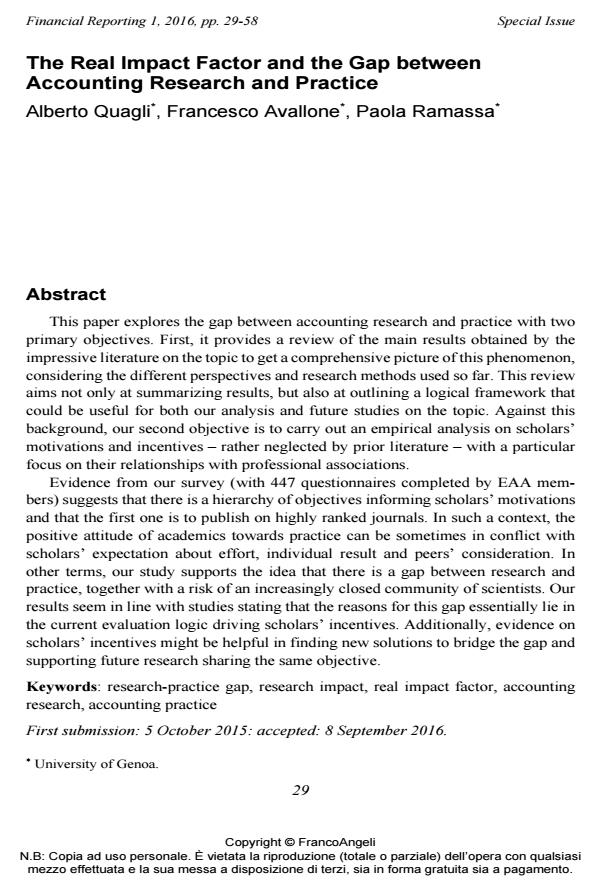The Real Impact Factor and the Gap between Accounting Research and Practice
Titolo Rivista FINANCIAL REPORTING
Autori/Curatori Alberto Quagli, Francesco Avallone, Paola Ramassa
Anno di pubblicazione 2016 Fascicolo 2016/1
Lingua Inglese Numero pagine 29 P. 29-57 Dimensione file 381 KB
DOI 10.3280/FR2016-001003
Il DOI è il codice a barre della proprietà intellettuale: per saperne di più
clicca qui
Qui sotto puoi vedere in anteprima la prima pagina di questo articolo.
Se questo articolo ti interessa, lo puoi acquistare (e scaricare in formato pdf) seguendo le facili indicazioni per acquistare il download credit. Acquista Download Credits per scaricare questo Articolo in formato PDF

FrancoAngeli è membro della Publishers International Linking Association, Inc (PILA)associazione indipendente e non profit per facilitare (attraverso i servizi tecnologici implementati da CrossRef.org) l’accesso degli studiosi ai contenuti digitali nelle pubblicazioni professionali e scientifiche
This paper explores the gap between accounting research and practice with two primary objectives. First, it provides a review of the main results obtained by the impressive literature on the topic to get a comprehensive picture of this phenomenon, considering the different perspectives and research methods used so far. This review aims not only at summarizing results, but also at outlining a logical framework that could be useful for both our analysis and future studies on the topic. Against this background, our second objective is to carry out an empirical analysis on scholars’ motivations and incentives – rather neglected by prior literature – with a particular focus on their relationships with professional associations. Evidence from our survey (with 447 questionnaires completed by EAA members) suggests that there is a hierarchy of objectives informing scholars’ motivations and that the first one is to publish on highly ranked journals. In such a context, the positive attitude of academics towards practice can be sometimes in conflict with scholars’ expectation about effort, individual result and peers’ consideration. In other terms, our study supports the idea that there is a gap between research and practice, together with a risk of an increasingly closed community of scientists. Our results seem in line with studies stating that the reasons for this gap essentially lie in the current evaluation logic driving scholars’ incentives. Additionally, evidence on scholars’ incentives might be helpful in finding new solutions to bridge the gap and supporting future research sharing the same objective.
Parole chiave:Research-practice gap, research impact, real impact factor, accounting research, accounting practice
- The assurance of non-financial disclosure: A longitudinal analysis of the academic and professional literature Michele Guidi, Marco Giuliani, Maria Serena Chiucchi, Stefano Marasca, in FINANCIAL REPORTING 2/2021 pp.5
DOI: 10.3280/FR2021-002001 - Interdisciplinary research by accounting scholars: An exploratory study Francesco Giovanni Avallone, Alberto Quagli, Paola Ramassa, in FINANCIAL REPORTING 2/2022 pp.5
DOI: 10.3280/FR2022-002001 - Gli "effetti indesiderati" dell'accounting come "scienza". Riflessioni sulla metodologia di ricerca nel management accounting and control Fabio Santini, in MANAGEMENT CONTROL 2/2021 pp.171
DOI: 10.3280/MACO2021-002010 - Non-Fungible Token valuation: State of the art and future insight Paola Paoloni, Giuseppe Modaffari, Martina Manzo, in FINANCIAL REPORTING 2/2023 pp.39
DOI: 10.3280/FR2023-002002 - Public university research engagement contradictions in a commercialising higher education world Lee D Parker, in Financial Accountability & Management /2024 pp.16
DOI: 10.1111/faam.12341 - Research-practice gap in accounting journals? A topic modeling approach Florian Philipp Federsel, Rolf Uwe Fülbier, Jan Seitz, in Journal of Accounting Literature /2024 pp.368
DOI: 10.1108/JAL-03-2023-0047 - Can “publishing game” pressures affect the research topic choice? A survey of European accounting researchers Paola Ramassa, Francesco Avallone, Alberto Quagli, in Journal of Management and Governance /2024 pp.507
DOI: 10.1007/s10997-023-09667-8
Alberto Quagli, Francesco Avallone, Paola Ramassa, The Real Impact Factor and the Gap between Accounting Research and Practice in "FINANCIAL REPORTING" 1/2016, pp 29-57, DOI: 10.3280/FR2016-001003